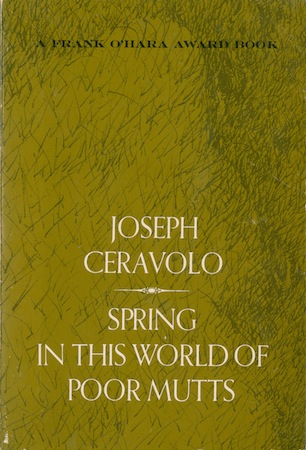Wild provoke of the endurance sky

Joseph Ceravolo’s poetry has been appearing here and there, though not very frequently, since the publication of Spring in This World of Poor Mutts (Columbia University Press, 1968), the first winner of the Frank O’Hara Award. His poems are and have been among the freshest, the most interesting, and the loveliest around. His voice is unlike anyone else’s, a combination of extreme dislocation and disjunction of language with pure lyric. The combination is unique, close to paradoxical, yet the poems manage to be completely convincing. This is an early one:
A SONG OF AUTUMN
A dog disappears
across a small lake.
It waits for me.
It goes where I want to go.
Begins to wake up the flowers.
So leave us alone.
Because no freedom can choose
between faces and
hours as destroyed as moving,
or cold water in the
sun. I can go out
now and measure
the flies that swing around trees
like doctors around a woman
full of bars and beauties
you could never make free;
Not even if the
flowers turn to moss and
loose sensations for their stems.
Ceravolo’s poems strike one as intensely personal, despite their modernist strategies. Many are gentle, intimate, about love, sex, family, weather, sadness, change, together with a sense of the cosmic forces that weave through and around all of these. Their riskiness in terms of language makes their success all the greater. His titles, which are like no one else’s, suggest some of the marvelous, difficult-to-pin-down qualities of the poetry: “The Green Lake Is Awake,” “Fill and Illumined,” “Passivation,” “Wild Provoke of the Endurance Sky.”
I think a part of his strength as a poet may derive from his other life as an engineer (or else relate to that part of him which is related to being an engineer). Despite the presence of so much feeling in his poetry, there is also a kind of rigor — coupled with a modesty, a tentativeness akin to Keats’s “negative capability” — which ensures: no sloppiness, no dishonesty. How about this for a beginning:
There’s nothing to love in this
rice Spring.
(“Warmth”)
Or:
I can’t live blossoming drunk
(“The Book of Wild Flowers”)
Here is a recent poem, one of eight printed in Big Sky 9:
ANNUAL PARALLAX
The sun is in the sky
and it is bright.
The signs are bright
and soon there is something
to shine. Until the flower
coming out of the soil.
There is something dark
in this bright sun.
It is not my feeling toward
you; the universe; or feelings
of Spring.
Ceravolo’s more recent poems, those that I’ve seen, are less severely dislocated syntactically and grammatically than his very early ones. But the marvelous childlike directness and wonder — he is the Master of the Quietly Blunt Question — are still there. The voice goes wherever it goes, by whatever it is led, by logic or not. The poems should be set to music if they haven’t been already; his major mode is pure, if distinctly modern, song. They should also be collected again, it’s more than high time. Because it’s a pleasure to copy them, and because they should be read above all, here are two more from his O’Hara Award–winning book.
PASSION FOR THE SKY
You are near me. The night
is rectilinear and light
in the new lipstick
on your mouth and on the colored
flowers. The irises are blue.
As far as I look we are across. A
boat crosses by. There is no monkey in me
left: sleep. There is something
sold, lemons. Corn is whizzing from the
ground. You are sleeping
and day starts its lipstick.
Where do we go from here?
Blue irises.
DATA
To indicate is to
turn off in a world
away from ease.
Rotating in a mean format of oxygen.
First make and then
made all alone until
the end of a blank.
The smoke opens up and out
comes a word
in a new storage of love.
Turning off or
turning on the calcareous bases
we find our selves in
are set there by IT.
Divine and more
divine each day, no control,
but in another world.
Previously published in No Other Way (Hanging Loose, 1998). Copyright © 1998 by Charles North. Reproduced by permission of the publisher.
An introduction
Edited by Vincent Katz